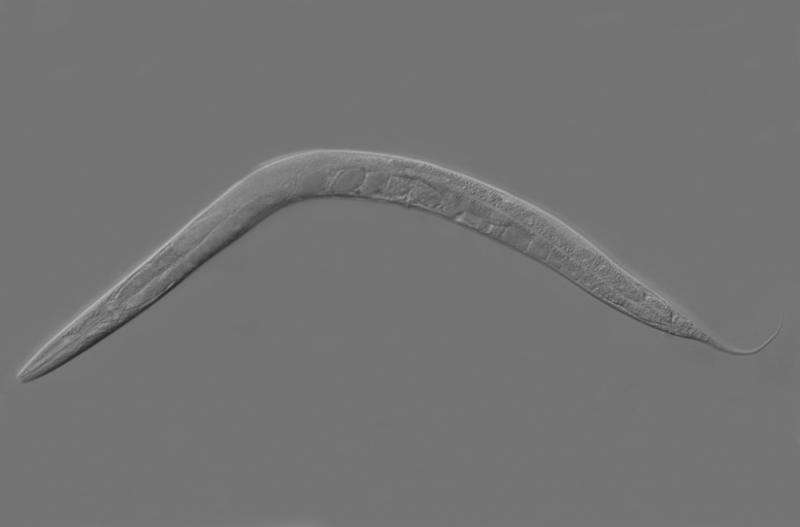How conflicting memories of sex and starvation compete to drive behavior

Two conflicting memories can both be activated in a worm's brain, even if only one memory actively drives the animal's behavior, finds a new study by UCL researchers.
In the paper in Current Biology, the researchers showed how an animal's sex drive can at times outweigh the need to eat when determining behavior, as they investigated what happens when a worm smells an odor that has been linked to both good experiences (mating) and bad experiences (starvation).
The scientists were seeking to understand how an animal's brain decides if something it encounters is good or bad, and how this determines the animal's response.
They found that by conditioning male worms to have both positive and negative associations with an odor, both memories will be activated when the worm smells the odor, but only one will impact the animal's behavior.
The researchers say their findings can be further investigated to gain insight into health conditions where this process goes wrong, such as in post-traumatic stress disorder (PTSD), where memories that should remain latent (dormant) are still problematically influencing behaviors and emotions.
Lead author Dr. Arantza Barrios (UCL Cell & Developmental Biology) said, "For our study, we were looking into the brain of the male worm, in order to understand the cellular or molecular mechanisms that determine if a particular memory impacts behavior. An important part of how we learn is that our brains are able to adapt to new information and override previous associations."
Co-first author Dr. Susana Colinas Fischer (UCL Cell & Developmental Biology) added, "By understanding what a very small worm is thinking, we are able to learn more about the processes underlying our own more complex thinking patterns."
The study was undertaken with male C. elegans roundworms, a species of worm 1mm in length that is very commonly used as a model organism in scientific research. The worms were presented with an odor that is innately attractive to them, which the researchers say is akin to a person smelling a delicious dinner.
In a series of experiments, the researchers modified the worms' preference for the odor and monitored their behavior and brain activity.
The worms' instinct to approach the odor was overridden by aversive conditioning, in which the worms experienced the odor together with a punishment of starvation. The researchers then sought to override this learned avoidance with further conditioning, whereby the odor was presented alongside a female mate and some sexual experience, so that the male worms developed a new positive association with the odor.
The analysis identified a circuit of brain cells that represents both positive and negative associations with things the animal has encountered previously, centered on a particular neuropeptide (a chemical messenger in the brain) that stores the memories of both the starvation and mating associations with the odor.
The researchers found that in worms that had been conditioned to associate the odor with starvation and mating, both memories were activated in the brain. But only one of them—the mating association—still caused the worm to approach the odor.
The researchers say this indicates that the prospect of a mating reward overrode the prospect of a starvation punishment, even though both memories remained intact—while the worm no longer avoided the odor, the negative memory of starvation was still represented in the brain activity.
Co-first author Dr. Laura Molina-GarcÃa (UCL Cell & Developmental Biology) said, "We found that even in an animal with a very small brain like that of a roundworm, two conflicting memories can both be activated at the same time, with one memory impacting behavior and one memory remaining latent.
"The way an animal's brain can flexibly represent something that is partly good and partly bad helps it to learn and adapt to new information. By understanding how some memories can override other conflicting memories, we hope to inform research into treating the maladaptation of this process, such as in PTSD."
More information: Conflict during learning reconfigures the neural representation of positive valence and approach behaviour, Current Biology (2024). .
Journal information: Current Biology
Provided by University College London



















